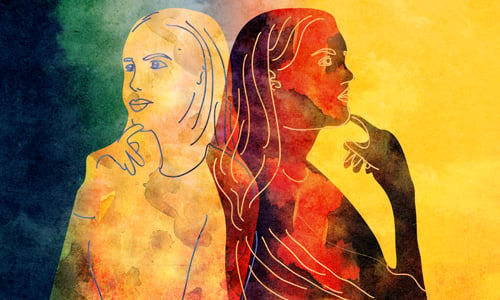In an age of instant messaging, instant coffee and instant soup, how long would you wait for a return on a favor before you wrote it off? How patient would you be for a response when we scorn our friends who don’t text or who actually still wait in line for a teller to conduct their bank business? Patience may be considered a virtue but for many, we are too impatient to be that virtuous. In this week’s parshah, we are treated to a glimpse of what patience is like for the righteous and a realization that our choices and actions do have an impact far beyond our wildest dreams.
Our choices and actions do have an impact far beyond our wildest dreamsIn the beginning of Parshat Vayechi, the Torah describes two different, yet connected visits that Joseph has with his aging father Jacob. In the first, Jacob called Joseph to his bedside and asked him to swear that he will bury Jacob in Israel, not in Egypt, as Jacob says “Do not bury me now in Egypt, I will lie with my forefathers, and you shall carry me out of Egypt, and you shall bury me in their grave.” Joseph was quick to respond, “I will do as you say.”
In the ensuing encounter, Joseph brought his sons Menasheh and Ephraim to see Jacob upon hearing that Jacob was ill. Jacob took this opportunity to bless them and began this blessing to his grandchildren with words of praise of G‑d for fulfilling the promise He made to Jacob that he would grow into a strong nation and inherit the Land of Israel. Jacob blessed Menasheh and Ephraim to be equal to the sons of Jacob in terms of inheritance of the land of Israel. Rather than having one portion of land called Joseph, there would be two portions, one for Ephraim and one for Menasheh. Before Jacob continued with their blessing, he reminded Joseph that he had not buried Rachel, Joseph’s mother, in the Tomb of the Patriarchs in Hebron but along the way upon reentering Israel.
Rashi, the classical commentary on Torah text explained that Jacob told Joseph that although he had not even taken Rachel into an inhabited part of Canaan, it was due to a Divine Command. In the future, Jacob related to Joseph, Rachel will be of comfort to her children during time of exile from her very grave on the outskirts of the land. Rashi brings a reference from Jeremiah (31:14-16), “A voice is heard on high, lamentation, bitter weeping, Rachel is weeping for her children. And the Holy One, Blessed be He, answers her, there is a reward for your work, says the L-rd . . . and the children shall return to their own border.” It appears as if Rashi is justifying the request that Jacob asks of Joseph to go out of his way to bury Jacob in Israel even though he did not do the same for Joseph’s mother.
The Lubavitcher Rebbe explains this passage in a most enlightening way. Do not look at this passage as if Jacob is justifying anything, and don’t for a moment believe that Joseph was upset with his father. Rather, Jacob was reminding Joseph just how incredibly strong and unselfish his mother was. If we look at the two times that Joseph visits his father, it would have been more logical for Jacob to Jacob was reminding Joseph just how incredibly strong and unselfish his mother was explain that he had buried Rachel along the way when he was asking Joseph to take his body out of Egypt, not when he blessed Ephraim and Menasheh. Yet, Jacob did not bring it up then. He brought it up when he was in the midst of blessing the two sons of Joseph. Could there be a connection between the blessings of Ephraim and Menasheh, the fact that Rachel was buried on the way to Israel, and the fact that G‑d listened to Rachel and her impassioned plea for her exiled children when He did not listen to the voices of other righteous leaders?
Who was Rachel? She was the favored wife of Jacob, the one for whom Jacob agreed to work seven years in order to marry. Yet on the day of her wedding, as Rachel was preparing for her wedding, her father Laban had other plans; he switched Leah, his older daughter for Rachel in an attempt to trick Jacob into marrying the less marriageable daughter. Rachel understood her deceitful father’s ways and realized that her dreams of the past seven years were about to be dashed forever.
Then, suddenly she remembered—the secret code! Of course! The secret code that only she and Jacob know. Jacob knew Laban was capable of unfathomable deceit so he devised a secret code that he would be expecting from Rachel from behind her veil at the wedding. Without this code, Jacob would know it was an imposter and he would not continue with the ceremony. Imagine the thoughts racing through Rachel’s head as she was thinking about the success of the plan she and Jacob had devised to outsmart Laban, the quintessential crafty person. But then Rachel thought about Leah and what would happen to her if she were unmasked at the ceremony. Rachel thought about the shame Leah would endure if she was discovered and decided that she could not put her sister through that shame. In a flash, not thinking about the sacrifice she was making, Rachel ran to her sister and shared the secret code. At this point, Rachel never dreamed that she too would marry Jacob; all she knew was that she had to protect her sister from tremendous embarrassment. Rachel was later granted the honor of marrying Jacob but on that day, all she understood was that protecting Leah was of paramount importance.
This was Rachel in her youth and as she grew, her strength grew too. As Jacob and his family were traveling back to his father Isaac into Israel, Rachel gave birth to her second son Benjamin. As she bore this son for Jacob, her strength ebbed and as her soul was about to leave her body, she desired to be buried there on the way and not in the Tomb of the Patriarchs for Rachel knew that in the future, the Jews would pass on this route as they were exiled by the evil Babylonian king Nebuchadnezzar.
A mother does not turn away from her childrenAnd as her children would pass by her tomb, she would be in a position to beg for their mercy, and to exact a promise from G‑d for the future redemption. What was her plea? What made her prayer accepted more than the prayers of other righteous people? The Midrash describes the valiant effort she made—“G‑d in heaven, I was willing to give up the opportunity to marry the righteous Jacob in order to spare my sister shame, can You not have enough compassion for your people to put aside Your own Will and forgive them? I thought about my sister first, please think of Your children and pardon them, promise me that You will bring them back home from exile.” And G‑d agreed.
This is the lesson Jacob transmitted to his son Joseph. Jacob did not want Joseph to think that he didn’t want to be bothered to bring Rachel to a proper burial, this was her choice, and this was her desired location for eternal rest. A mother does not turn away from her children.
What is the result of her decision? This is where the connection between the explanation of Jacob and the double blessing to Joseph’s sons becomes clear. Jacob was really telling Joseph something very striking. Ephraim and Menasheh will have portions in the land of Israel equal to their eleven uncles not because they are most deserving, although they are, and not because of my special relationship with you, my firstborn from Rachel, although this is also true. They deserve this enormous honor in the merit of the selfless deeds of their grandmother, my beloved wife Rachel. Her actions so many years ago—her willingness to share her secret with her sister, and to give up her share in the eternal resting place in the Tomb of the Patriarchs in order to offer solace to her descendants allowed Joseph’s sons the honor of tribal rights.
Don’t have the patience to wait? Think of Rachel.






Join the Discussion